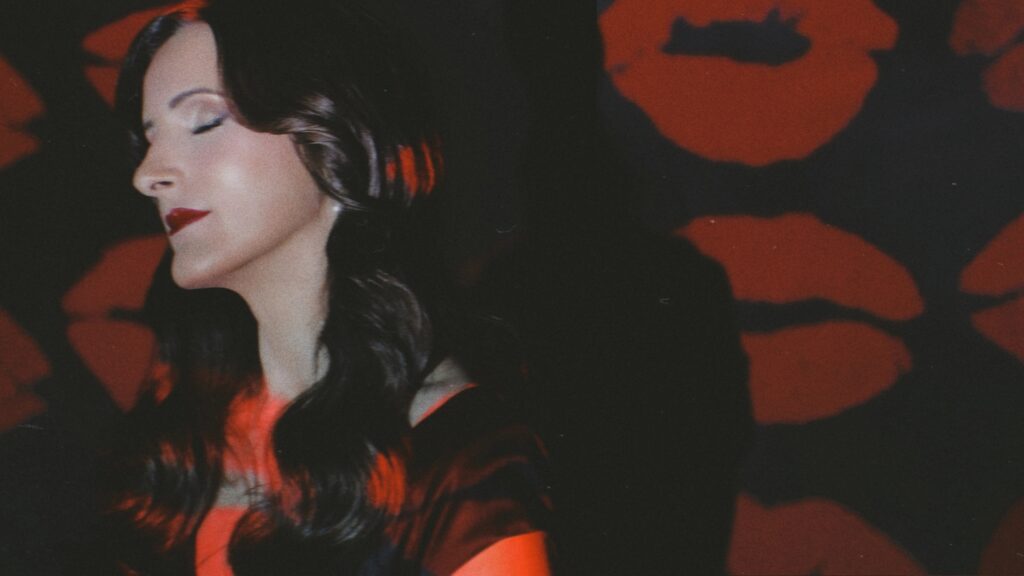Eleri Ward’s new album Internal Rituals begins in quiet revelation. Across twelve songs, the New York-based artist gently peels back layers of self-perception, transforming her years of theatrical discipline and indie-folk exploration into something radiant, fluid, and defiantly personal. Known for her reimagined acoustic renditions of Stephen Sondheim’s catalog, Ward first drew attention for the purity of her voice and the emotional precision of her phrasing. Critics from The New York Times and Forbes praised her luminous interpretations, calling her work “hauntingly beautiful” and “preternaturally gifted.” Yet Internal Rituals is where the story shifts. For the first time, she steps entirely into her own world, using electronic textures, layered vocals, and dreamlike pop arrangements to trace an emotional map of self-love, grief, and renewal.
Ward describes this shift not as a calculated decision but as an organic realization. “I don’t really look at it as a moment of convincing, but a mere recognition of where my inspiration was truly taking me,” she says. “Before I released my live Sondheim album, I knew that had to be it for me because I was already beginning to write in new ways I hadn’t before, and I wasn’t finding inspiration in covers like I had been for multiple years. It’s as simple as listening to what’s going on in my head and honoring that.”
That instinctive clarity runs throughout the album. Internal Rituals sounds like an artist learning to listen again, not only to the music forming in her mind but to the quiet frequencies of transformation. Tracks like “Float” and “There You Go” shimmer with a sense of surrender, blending ambient folk with cinematic pop structures that never settle into predictability. Her vocals, capable of theatrical command or whispered intimacy, feel as if they belong entirely to the moment.

Ward doesn’t analyze the balance between those modes. “I don’t think about it,” she says. “I just express myself as feels most honest for the song. I think if I were to prescribe a vocal performance to myself, you would hear it, it might sound just as good, but something would feel off about it. I let myself go free and let whatever comes out, come out.” Listening to the album, that freedom becomes the record’s pulse. Ward’s voice moves between registers like water finding its natural course, sometimes floating above the production in crystalline falsetto, other times sinking into deeper hues that evoke the intimacy of a diary entry. The music feels equally fluid, shaped by jazz-inflected chords, celestial synths, and bursts of acoustic instrumentation that recall the organic sensibility of her earlier work.
Healing is a central thread in Ward’s songwriting. The album, she says, became a vessel for understanding her own emotions and experiences as they unfolded in real time. “Definitely a way to heal,” she reflects. “Writing is always a closure and a sealant for any experience I go through and process.” That act of writing as self-preservation is most visible in songs like “Someone, Something New,” which explores her relationship with her biological father. It’s one of the record’s most vulnerable moments, anchored in a gentle piano melody that seems to breathe alongside her words. “Nothing is ever off the table for me when it comes to my music,” she says. “I also didn’t write this album in the way of producing a huge batch of songs and then pick and choose which ones belong. I wrote the whole thing song by song, moment by moment as I traversed through this period of transformation, and this song just so happened to encapsulate a vital discovery along the way.”
That approach gives Internal Rituals a sense of narrative continuity, as if every track were a chapter in a single evolving thought. The songs don’t feel designed for radio rotation or algorithmic playlists; they unfold like letters written to oneself. The result is a body of work that mirrors the nonlinear process of self-discovery. “This is precisely what the album is about,” Ward says. “I feel like I’m seeing the world through new eyes. I love life. I’m peaceful. I’m excited. I’m enlightened. I’m inspired.”
That joy, though grounded in self-awareness, never dissolves into sentimentality. On “Run,” one of the record’s standout tracks, Ward channels the urgency of reinvention. The song swells with rhythmic momentum, its synths and percussion mirroring the restless motion in her voice. Yet it isn’t drawn from autobiography in the most literal sense. “Run is interesting because it was actually inspired by a female historical figure that I’m writing a musical about,” she says. “I felt so connected to this sense of being too big for your current environment and thus feeling misunderstood, I had to follow that. So it’s basically my personal musing on this larger, separate story that I relate to on a really deep level.”

The interplay between storytelling and self-reflection defines Ward’s work. Trained in both music and theater since childhood, she brings a dramaturgical awareness to her songwriting, sculpting atmosphere as carefully as she shapes melody. The album’s arrangements blend cinematic pop with traces of jazz and ambient folk, a sound she describes as completely intuitive. “These are the sounds I hear in my head,” she explains. “I can tell you I love Caroline Polachek and other artists I listen to regularly, but this soundscape is genuinely just from my brain and expressed through my intuition.”
Even in its most abstract moments, Internal Rituals never loses its emotional anchor. “Venusian Light,” a luminous ode to self-love, might be the album’s spiritual center. It glows with a slow-burning sense of acceptance that Ward articulates as a newfound freedom. “I’ve never felt less inclined to explain myself, which to me is the biggest indicator of internal fulfillment,” she says. “I feel really whole, and in that wholeness is a lack of care for anyone else’s opinion on what I’m doing or how I’m doing it. When you’re in love, nothing else matters.”
Ward’s refusal to explain or justify feels radical in its simplicity. Ward’s work often speaks to the tension between external performance and internal truth, a duality rooted in her years of theater training and her emergence as a solo artist. Yet she isn’t rejecting the theatrical; she’s expanding it. Her live shows have evolved into immersive experiences that reflect the meditative energy of her music. “I’ve been playing live shows of the album since May,” she says. “It’s the most exhilarating experience, and it is an experience, not just a concert. It’s like a long form meditation that takes you all sorts of different places, and I get to express that and share it with intimate and dropped in audiences. I had a combo of tracks, keys, and guitar, and I’m so happy to be liberated of a stool and guitar in order to fully embody these songs physically, emotionally, and vocally on stage.”
That sense of embodiment—of art as something lived rather than performed—runs through the album’s core. Internal Rituals doesn’t seek to present a polished version of selfhood but rather to capture the process of becoming. Ward’s decision to self-produce parts of the album and learn beat-making marks another layer of autonomy. The result is a sound that feels personal without being insular, cinematic yet handmade, as if each song were built from the textures of her own environment.

For listeners who first encountered Ward through her acoustic Sondheim interpretations, this new record might feel like a leap into the unknown. Yet for Ward, it’s a natural extension of the same artistic curiosity that fueled those projects. Her earlier albums, A Perfect Little Death and Keep a Tender Distance, reimagined Sondheim’s compositions through sparse, intimate arrangements that revealed the emotional architecture beneath the Broadway gloss. What Internal Rituals does is take that same emotional excavation inward, using her own stories as the source material.
It’s easy to draw a line between her theatrical training and her new pop sensibility, but what’s more striking is how she dissolves the boundary between them. Ward’s songs carry the narrative clarity of musical theater, yet they move with the atmospheric fluidity of dream pop. The result feels like something entirely her own—a genre that speaks to intuition and introspection more than style or scene.
When the album closes with “Venusian Light,” it leaves the listener suspended between resolution and continuation. It’s a deliberate gesture, she says. “The journey never ends. If you play the album on loop, ‘Stepping Through’ can absolutely be the next song after ‘Venusian Light.’ There is satisfaction in arrival while knowing any arrival is only the beginning of yet another path to another place and another identity. We are always evolving.” And this sense of perpetual motion defines Ward’s artistry. Her career so far has unfolded like a conversation between versions of herself—the theater student, the interpreter, the songwriter, the producer. Each incarnation informs the next. On Internal Rituals, those voices converge, not to harmonize perfectly but to coexist in tension, allowing space for both vulnerability and strength.
Listening to the record feels like entering that conversation. The music invites you to linger in the in-between places, where identity is still forming and self-understanding feels tender but alive. Ward isn’t offering answers so much as extending an invitation: to sit with uncertainty, to honor the internal cycles that shape us, to believe that transformation can be its own form of peace. “I feel like I’m seeing the world through new eyes,” she says, and you believe her. The clarity in her voice doesn’t come from performance but from presence. Internal Rituals isn’t simply an album about self-discovery. It’s a reminder that art, at its most sincere, isn’t about declaring who we are—it’s about allowing ourselves to change.
Featured Images: Artist Supplied





